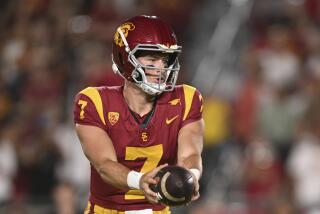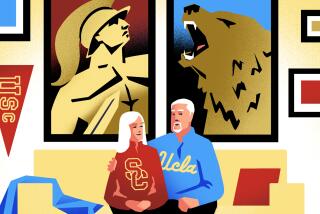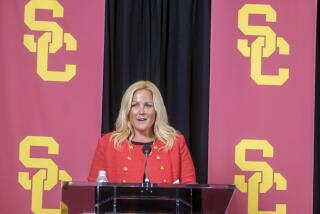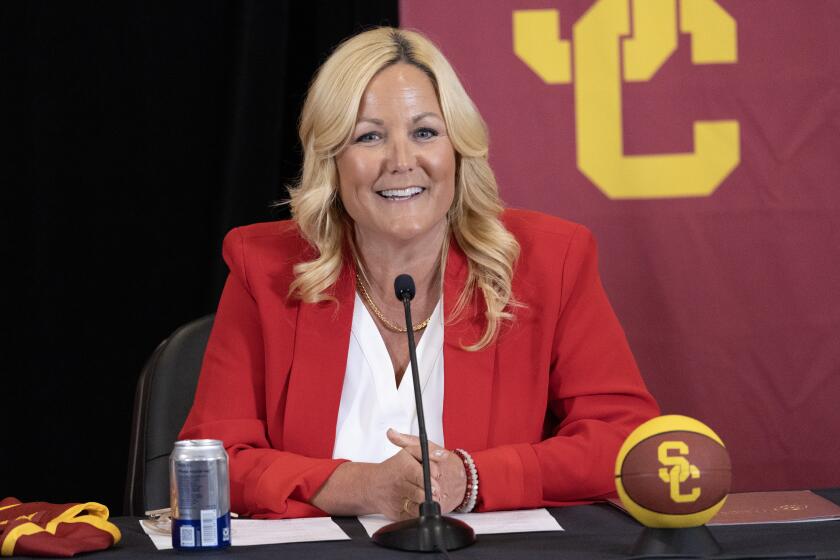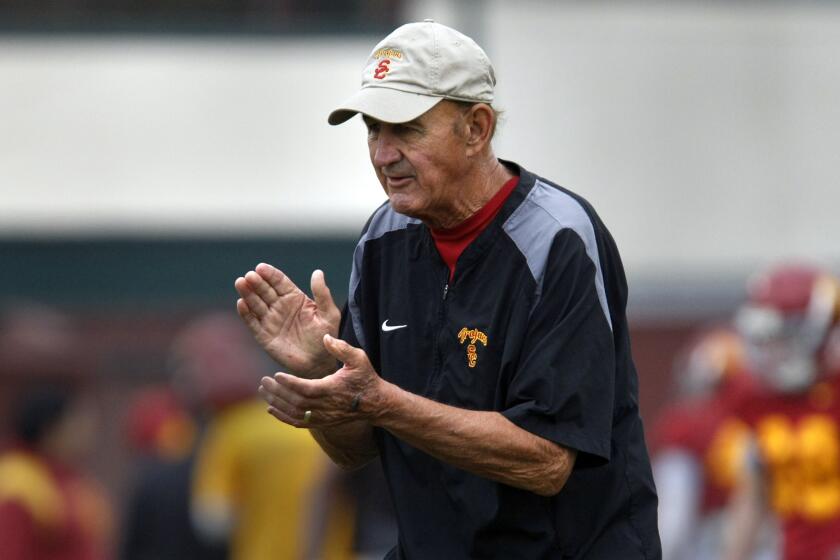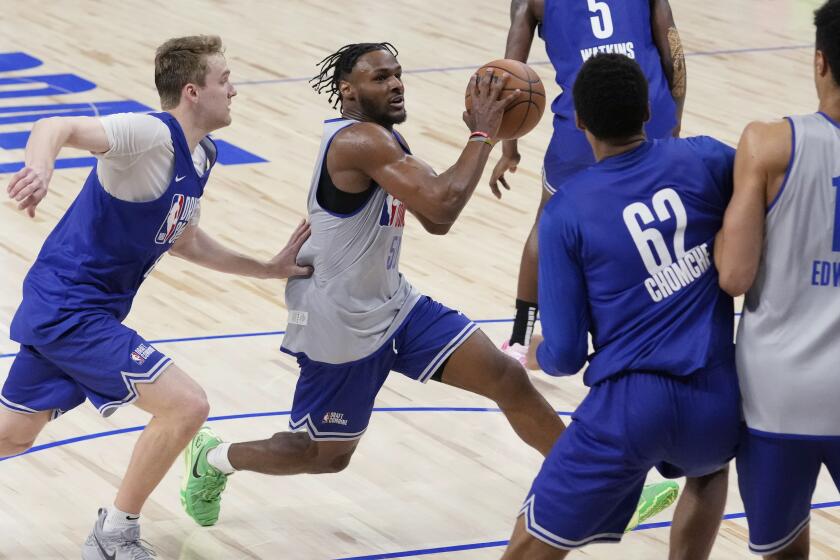Mike Caston is living to see USC win another Rose Bowl
Mike Caston has a serious problem.
He’s a die-hard USC fan.
Maybe die-hard is hitting a little close to home for someone such as Mike, who is dealing with the death sentence that is Lou Gehrig’s disease. But as his wife, Judy, explains, Mike really is beyond help.
They are celebrating an anniversary over a romantic dinner, married 26 years ago on Valentine’s Day, Judy asking Mike for the highlight of their time together.
“Without hesitation, and that’s without hesitation,” Judy says, “Michael replies, ‘the Pete Carroll era.’ ”
She’s laughing and Mike, who struggles to talk now because of the creeping ravages of ALS, says, “I wasn’t trying to be funny.”
He is who he is, a USC honk and the most positive person Judy has ever met, remarkable in attitude beyond ordinary comprehension … and your day will be better for getting to know him as well.
He’s like you much of his life, a ’73 USC grad, father of three sons, four grandchildren, a science teacher dabbling in coaching before becoming a school superintendent in Palos Verdes, Santa Barbara, Charter Oak (Covina) and Escondido. He was California super of the year in ’06.
Nine years ago, an annual physical becomes a leukemia discovery, his blood disorder so rare doctors wondered whether he could be saved.
“It wasn’t the worst thing that could happen to me,” Mike says. “It wasn’t like they were telling me my kids were sick.”
His doctor attends a convention and hears of a chemotherapy cocktail that might save Mike’s life. He calls, it’s December, and Mike says he can’t undergo treatment until after Jan. 2.
“USC was playing in the Rose Bowl and USC basketball was playing the next day,” Mike explains, as if everyone understands.
The chemo works. He’s no longer sick, unless owning USC women’s basketball season tickets counts.
“It’s my father,” he explains, time spent in the Coliseum together leading to his love affair with USC.
“Haven’t missed a home game since, and started going to road games in 1985. It’s not about winning; it’s about having fun.”
He frowns on those who yell at college kids or spread hate on message boards. He watches more as coach than fan, yet never criticizes those coaching.
The leukemia behind him, he begins to notice the words are not coming out of his mouth as they should.
He undergoes tests for a year, everything else eliminated, as they do in diagnosing ALS — amyotrophic lateral sclerosis, better known as Lou Gehrig’s disease.
That was 16 months ago, with doctors telling him, “No cure, no treatment.”
“How long?” he asks, and he’s told, “For 99%, an average of three years.”
So he begins to formulate his 10-year plan.
A positive attitude helps with leukemia; nothing changes the advancement of ALS. But he wants to believe his positive attitude can be infectious and affect others.
“I’m not going to waste the time I have worrying,” he says.
He can no longer eat or drink anything; he is fed through a tube in his stomach. He misses his spaghetti and meatballs, and maybe his Starbucks more than anything, but he’s not complaining.
“I do what is necessary to stay alive,” he says. But what happens when his body betrays him and he’s left sitting with only the ability to think?
“I want to live as long as I can,” he says, 64 now. “I want to experience everything.”
He has undergone surgery so his diaphragm can be electronically exercised while he sleeps. His neck muscles are beginning to fail, and a brace inevitable.
“ALS patients die because they cannot breathe and suffocate,” he says, his approach simple. “If there is a problem, we find a solution.”
He’s a gifted speaker, but now it’s a struggle to talk and be understood. “I have two options,” he says. “Not talk, and I don’t like that option. Or, keep trying.”
It seems unfair, beating leukemia only to be targeted again.
“I think what’s unfair is when a child dies,” he says. “I’ve had a great life.”
There has to be a moment where he’s just been devastated? “Yes,” he says, “When UCLA beat USC, 13-9.”
He gets Botox injections in his salivary glands to help him speak. He will communicate via his iPad when he loses his voice, his 7-year-old granddaughter Ella already practicing and leaving the message: “I love you.”
He is asked whether the last 16 months with ALS have gone as he thought. He says, “I’ve deteriorated faster than I thought I would.”
He’s not rattled. He says, “It’s reality,” and he really is this unbelievable. .
He’s looking at a picture of his grandchildren — a “huge motivation,” as he calls them — while saying he’s now allowing his three sons to handle their impending loss in their own distinct ways.
After all, he’s still got another nine years by his calculations. “And what a waste of time had I thought of only the worst.”
There is a USC flag and USC doormat outside the Caston home and, yes, so much more fight on inside.
“Michael’s done a lot for me in life,” Judy says, her eyes watery, and not for the first time, she admits. “Right now it’s a journey of discovery, and we’re taking it together.”
They have tickets and reservations to attend every game, Mike vowing to stay alive until USC wins another Rose Bowl.
So I call Coach Lane Kiffin. He’s busy, but stops immediately to talk to Mike, who is telling Kiffin he’s doing a good job.
There’s no way Kiffin can understand what Mike is saying but the two continue to chat.
Later, Mike says, “I’m not happy having ALS; this really isn’t fun. But I got to talk to Lane Kiffin.…
“I love the way the team played with heart last year,” he says. “I really like Kiffin.” But then he also liked Paul Hackett.
Maybe some in Mike’s place might mark time with the next medical procedure, but he’s all about USC’s opener. He’ll be waiting at the gate, as he has done for decades, to be the first inside. Sometimes, as one of his sons points out, he’s the only one sitting in the Coliseum just waiting for warmups to begin.
Mike will not leave until the game is over and the band finishes playing.
“If I could,” Judy says, “I’m sure I’d be asked to go to the bathroom for him.”
Or, as Mike puts it, “I hope I don’t die during the football season,” because he has more games to see.
“We’ve all been given a death sentence, haven’t we?” he says. “We just don’t know when, how or where. But we really don’t think about it.
“I look at it the same way. I might go sooner, but we all want the most and the max out of our lives. Like everyone else, that’s all I want.”
More to Read
Go beyond the scoreboard
Get the latest on L.A.'s teams in the daily Sports Report newsletter.
You may occasionally receive promotional content from the Los Angeles Times.
